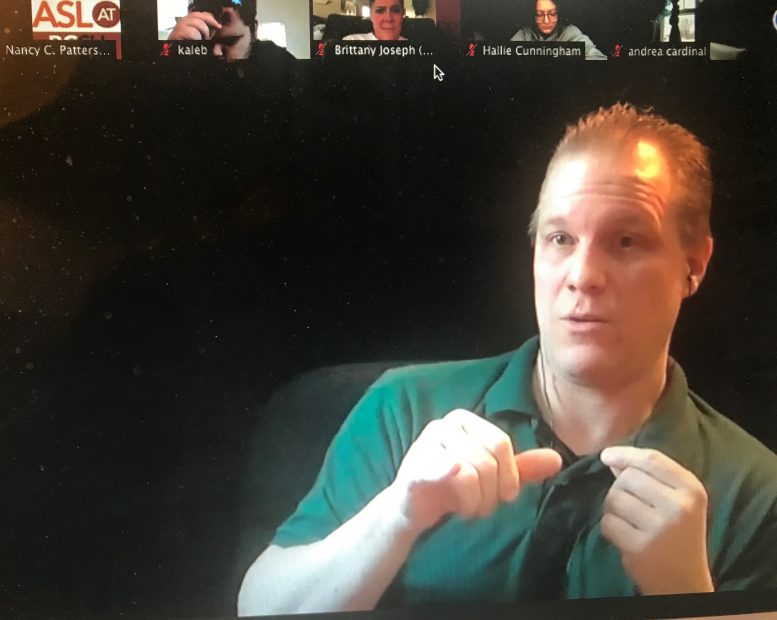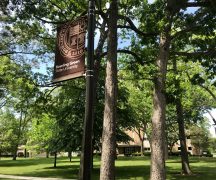By DAVID DUPONT
BG Independent News
The Faculty Senate Tuesday formally called upon the administration of Bowling Green State University to preserve the American Sign Language program as it currently exists.
The university had announced it was ending the program last spring, but then relented to allow any students who begun the four-course sequence to complete it.
Dawn Shinew, the dean of the College of Education and Human Development, said that the program had to be cut because the college had a budget shortfall, and ASL was not required for any of the college’s students to graduate.
The focus, she said, had to remain on getting students in Education and Human Development the courses they needed to graduate on time.
The resolution passed by the faculty senate at a special session calls on the administration to make sure the college has the funds needed to continue the program, or to move it to another college.
The resolution also calls on the program to continue to be taught by BGSU faculty. The program had employed two part-time instructors and one full time teaching rank faculty member.
At the previous Faculty Senate meeting, Provost Joe Whitehead said the university was working on other ways of continuing teaching ASL. He referred to partnership and indicated the teaching could be continued online.
A statement issued Tuesday on behalf of the provost and President Rodney Rogers stated they “have since made the decision and reaffirmed the University’s commitment to offering American Sign Language (ASL) I, II, III and IV courses moving forward.”
A request for clarification of whether that means in the current format or under a new format has not been answered as of late Wednesday afternoon.
In presenting the resolution, Kenneth Borland, who teaches in the Department of Higher Education and Student Affairs, said that because the reason for ending the ASL program was financial, it was important to put forward an economic solution.
That would be for the university to completely fund the program until such time as the College of Education and Human Development or another unit could fund it.
This is not unprecedented, said Borland, who previously served as provost. He noted during the 2008 recession, two colleges were faced with budget woes that restricted offering programs that would help them improve their programs and further the mission of BGSU.
In that case, the university stepped in and provided the needed funds. Those colleges were able then to successfully move forward to the benefit of BGSU.
Allen Rogel, who teaches astronomy, said that ending the program will also cost the university tuition money, and that needs to be factored in.
Among those speaking in favor was student Hallie Cunningham. She’s has benefited greatly from the courses. She also praise Professor Rebecca Sidders, the full-time ASL teacher, for her work transitioning the program online during the pandemic. “It is so much harder to do this over Zoom,” she said. “Masks are a barrier.”
Amy Robinson, who teaches in the Department of World Languages and Cultures, noted that President Rodney Rogers was “enthusiastic” because the financial impact of the pandemic has been less than expected about moving forward with initiatives that strengthen the university. Also, there’s been much discussion about ending the practice of keeping funding within “silos” that stands in the way of innovation.
“This works as a perfect opportunity to show how this works,” she said.
That ASL doesn’t provide credits that EDHD students are required to have shouldn’t mean the opportunity shouldn’t be offered, she said. It does meet the foreign language requirement for other students. About 400 students have enrolled in ASL courses.
Tim Brackenbury, who teaches in the Department of Communications Sciences and Disorders, said many students in that program take ASL courses.
“Not having ASL courses will make our program less favorable to potential BGSU students,” he said. “I don’t think that we would lose many incoming students by not having ASL, but one never knows.”
Remy Attig, from the Department of World Languages and Cultures, said that the program also has an impact of local members of the deaf community. For ASL students, going into the community is their equivalent of traveling abroad.
Borland’s resolution was amended in two key ways.
David Jackson, president of the Faculty Association, amended it to include language stipulating the courses should be taught by BGSU faculty.
At the urging of Nancy Patterson, in the School of Teaching and Learning within EDHD, the resolution shifted the wording of the resolution to explicitly put the financial burden on the university not the college.
Within the current budget strictures, she said, if the college were to be required to find the funds to continue ASL, it would have to cut other programs, meaning the loss of some teaching positions.
The final resolution, which was passed by the senate read: “Bowling Green State University will fully and immediately restore the regular offering and delivery of all four of its ASL courses by BGSU faculty, that EDHD and or BGSU will fully and immediately restore admission to the ASL Minor, and that BGSU will fully fund the regular offering and delivery of all four of the ASL courses and the ASL minor, including rehiring the affected faculty members, until such a time as those courses and the minor can be fully funded by EDHD and/or another BGSU academic unit.”
The complete statement issued Tuesday from the provost and president reads: “As previously shared with students, faculty and staff in various communications in last couple of weeks, President Rogers and Provost Whitehead value the feedback from our community and have since made the decision and reaffirmed the University’s commitment to offering American Sign Language (ASL) I, II, III and IV courses moving forward. They appreciate the resolution from Faculty Senate today.”
“





